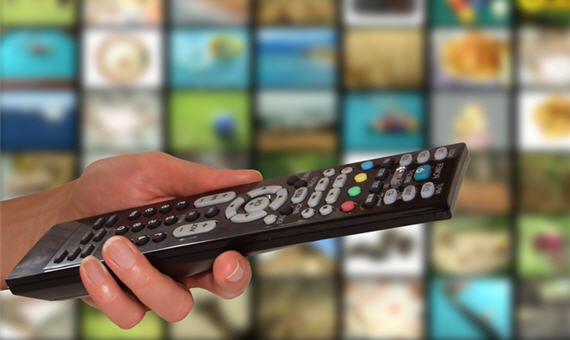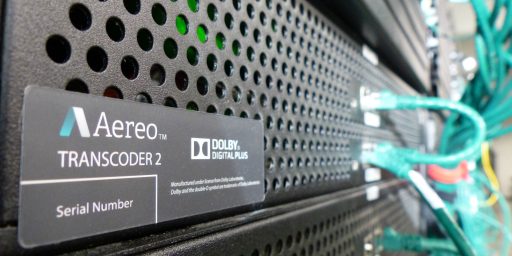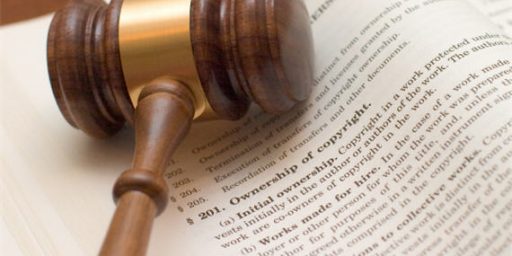Aereo And Broadcast Networks Battle Over The Future Of Television
Tomorrow, the Supreme Court will hear argument in a case that will likely be this era's version of the Betamax case.
Tomorrow morning, the Supreme Court will hear oral argument in a case that promises to have a huge impact on the television industry and how Americans are able to view television programming, specifically programming that is offered over the air for free. On one side of the case we have each of the four major television broadcast networks, Fox, CBS, ABC, and NBC. On the side is Aereo, Inc., a company that allows people to watch time-shifted television broadcasting online by intercepting the over-the-air signals. Ironically, Aereo’s financial backer is Barry Diller, the man responsible for the founding of Fox Broadcasting and the USA cable network. The television networks and those arguing on their behalf contend that Aereo’s technology is essentially piracy and that the company is purporting to make money by stealing content. Aereo argues that the fact that the content is available over the air means that it’s available for anyone’s use. The networks, meanwhile, have threatened to end over-the-air broadcasting altogether if Aereo is not shut down, although it’s hard to tell just how serious a threat that actually is.
Whatever the Court decides after tomorrow’s hearing, though, it will shape the television and online entertainment industries for years to come
Since 2012, Chet Kanojia has been building a business, backed by the media mogul Barry Diller, with ambitions to join that cohort. His start-up, Aereo, uses tiny remote antennas to capture broadcast TV signals and store them in the cloud, where consumers can watch them on a device of their choosing — no cable box, no cable bundle and most important, no expensive cable bill.
Instead, consumers pay $8 to $12 a month to watch almost live — there is a delay of a few seconds — and recorded programs from the major broadcast networks and public television. It’s a threat to both the lucrative cable bundle and the networks that receive rich fees for being part of that cable package. Aereo would give so-called cord cutters the means to assemble a more affordable package of online streaming options like Amazon Prime, Apple TV or Netflix, and still spend a Sunday afternoon watching the N.F.L. and “60 Minutes” immediately afterward. As antenna-driven viewing has dropped and digital consumption has surged, Aereo is a way to put old wine in a new bottle.
It is a crafty workaround to existing regulations, which rides on the Cablevision court ruling in 2008, which held that consumers had the right, through their cable boxes, to record programming. But then, cable companies pay broadcasters billions in so-called retransmission fees while Aereo pays them exactly nothing. (And the case is not just about Aereo — it opens the gate for cable companies or others to build a similar service and skip the billions in payments to the networks.)
The broadcast networks have a technical legal term for this particular innovation — theft — and they have been trying to shut down Aereo from the start.
(…)
“This is the Sony Betamax of this century,” Mr. Kanojia said on the phone last week, citing a case that is likely to come up a lot on Tuesday.
The entertainment industry hated the Betamax decision and said it would lead to ruin — it didn’t — and the networks are just as opposed to a federal appeals court ruling last year to let what they see as Aereo’s chronic, classic infringement continue. In the broadcasters’ brief asking the Supreme Court to reverse that decision, Aereo was described as “an entire business model premised on massive and unauthorized commercial exploitation of copyrighted works.”
As a matter of copyright law, television programs can be shown only by those who have that right or a license to do so. That’s why bars and hotels must pay a fee for the programming they show on their televisions. And broadcasters say that Aereo is similarly a middleman that should pay for what they consider a public performance.
Aereo was conceived in the belief that because the consumer is the one who is pushing the button to watch live or recorded programming, that transaction is one-to-one and not a public performance. That the DVR is in the cloud and the antenna is remote is, in Aereo’s view, beside the point. In its arguments, Aereo embraces both the past (consumers have been using VCRs and then DVRs to record programming for decades) and the future (everything from Dropbox to Google Drive lets the consumer store what he wishes without any liability on the provider’s part).
Speaking on the phone on Thursday, Mr. Kanojia said he liked his facts but had no idea how things would play out.
“It’s a bit of a coin flip,” he said.
A lot of people will be watching to see how that coin lands, less because of what it means for Aereo specifically than what it portends for the broader media ecosystem. A decision is expected this summer.
Lyle Denniston previews the legal arguments in the case:
The broadcasters’ merits brief has two central themes: an intense focus on the actual text of the Copyright Act’s “transmit” clause, and a broad copyright policy argument against allowing clever inventors to devise ever-new ways to pirate the protected works of creative entities like TV broadcasters.
Throughout the brief, the TV industry entities sought to keep the Court’s attention on what Aereo does with a system of its own creation: it picks up programs off the air, and then re-transmits them, for a fee that seriously undercuts their competitors, to a public that can simultaneously watch the very same program — like the Super Bowl, for example — without paying a cent for the opportunity. “That is a textbook public performance under the transmit clause,” the document asserted.
When Congress wrote the Copyright Act revisions in 1976, mainly to overturn Supreme Court decisions that gave broad exemptions to copyright protection, the industry brief said, it did so in a “technology-neutral” way, to cover modes of transmission that existed at the time, as well as any that might be invented in the future.
If, however, the Court might find itself looking to the role of the ultimate consumer, the broadcasters’ brief lumps Aereo’s paying customers into a single whole that represents “the public” — precisely the mass audience that the broadcasters say Congress had in mind in 1976 when it curbed the opportunity to create new technologies to avoid paying royalties to the originators of copyrighted TV and other creations.
The federal government has entered the case as an amicus supporting the broadcasters’ plea to overturn the Second Circuit ruling. However, it sought to add a note of caution, telling the Justices that they should craft a ruling that would not “call into question the legitimacy of innovative technologies that allow consumers to use the Internet to store, hear, and view their own lawfully acquired copies of copyrighted works.”
The key phrase in that suggestion, though, is “lawfully acquired.” The government brief clearly sided with the broadcasters in condemning the Aereo system, arguing that, with the pervasive control that the company has over every facet of its system, it is directly infringing on copyrighted TV programs. Aereo, it noted, “both owns and actively controls the individual antennas, centralized servers, and software that operate together to receive broadcast signals and transmit copyrighted content to the public.”
It does not make a difference, the government document argued, that individual customers of Aereo decide what they want to watch. It is the “commercial actor” who serves those customers, with a system of its own devising, that counts the most for purposes of copyright law, the brief asserted.
On both the issue of what “performance” means, and on what transmission to “the public” means, according to the government, Aereo loses.
The cautionary note that the government put into its brief, it indicated, was designed to assure that the decision in this case does not “threaten the legality of cloud computing” — that is, the recently developed technology that gives digital consumers new ways to play back copies that they have obtained legally in the first place. Contrasting that service with Aereo’s, the government argued that Aereo is illegally obtaining access to the copyrighted works in the first instance.
Aereo, throughout the briefing on this case, has regularly added in a reminder that the broadcast companies are the very special beneficiaries of the right to use the hugely valuable public broadcast spectrum, and that the price they must be willing to pay for that is to keep their programs available free. Its brief on the merits seeks to add new emphasis to that point, presumably to try to show that these companies are hardly in a distressed condition, and to subtly hint that it takes some temerity for them to try to keep consumers from getting wider access to those programs at lower prices than they pay to cable TV companies now.
Very early in the new brief, Aereo commented upon the broadcasters “enforceable public obligations,” including the obligation to make even copyrighted programs that “will be made available to the entire public within range of [the broadcasters’] signals.”
That obligation has been long-standing, Aereo noted, but what has changed is that consumers regularly have been gaining new ways of getting access to those programs. The service now provided by Aereo, it suggested, is merely another innovation in that history. The difference with its service is that consumers no longer have to have receiving and recording equipment in their homes, because the shows they want will be stored on “the Internet ‘cloud.'”
What Aereo is doing, the brief added, is capitalizing on “widespread access to high-speed Internet connections.”
On the surface, it really doesn’t seem to me that Aereo has a very sympathetic case. Yes, the signals that they are intercepting for distribution online are there for anyone to “capture.” However, there’s a rather obvious difference between someone who has an antenna on their roof that captures the digital signals that the network’s affiliates broadcast so they can watch them on their television and Aereo taking those same signals, repackaging them into an online stream and charging users a subscription fee to access these signals in manners that they otherwise would not be able to do. The first is using the signals for what they were intended, the second most clearly is not. Unlike the Betamax case, which many of Aereo’s supporters cite in support of their arguments, Aereo is not merely giving television viewers an additional tool they can use to record signals coming into their home. Instead what they are doing here is not all that dissimilar to the original Napster service, which allowed people to “share” their music collections with others in a manner that allowed people to obtain personal copies of music that they had not purchased. That version of the Napster service was, of course, eventually shut down after the music industry succeeded in obtaining court orders finding that the service was, in effect, piracy. The movie industry has pursued a similar strategy against sites that have allowed people to download digital copies of movies via services such as BitTorrent. In the end, there doesn’t seem to me to be much of a distinction between what Aereo is doing here and what Napster and the movie pirates did.
The consensus opinion from the legal analysts I’ve read as this case has made its way through the Federal Courts seems to be that the Supreme Court is unlikely to rule in Aereo’s favor, at least not to the extent of saying that the company is free to make money off of content that it isn’t paying for. Not only would such an outcome not make any logical sense for the reasons I note above, but it appears that the broadcasters have a fairly strong case under the Copyright Act for their claim that Aereo’s violates their rights under that law by not compensating the broadcasters and their affiliates for the content that it sells to its customers. If there is a ruling in Aereo’s favor, it is likely to be a fairly limited one that puts so many constraints on how Aereo may use the content it intercepts that it would make their business model rather impractical. In any case, we’ll get at least some indication of which way the Court is leaning at tomorrow’s oral argument. No doubt the Justices are already well aware that how they decide this case is going to have a huge impact on how Americans are able to access their entertainment, and whether the current business model that the broadcasters and cable companies are operating under can survive.






Aereo has very little chance of prevailing. The networks have assembled an all star team with former Solicitor General Paul Clement as well as Jenner & Block appellate chairman Paul Smith and Debevoise & Plimpton’s Bruce Keller. From the NLJ, ” The National Football League, Major League Baseball, the Obama administration, and associations of composers, authors and actors lined up behind the major networks, while small and independent broadcasters, DISH Network, the Consumer Federation of America and others filed for Aereo.”
Cable is a Monopoly and that will continue indefinitely until Big $$ lobbying is curbed. the biggest joke are Verizon & AT&T which were supposedly going to lower prices competing with large carriers like Cablevison, Comcast, & Time Warner. I’m still waiting for that to happen…
I just caught Comcast overcharging me for the umpteenth time. Funny how they never undercharge me.
Did someone actually utter those words with a straight face? Impressive.
Is there?
We both agree that I can record programming off the air for my own later re-use. Here’s the question: can I outsource that job? Can I pay my neighbor a few bucks to do it for me? Or is that piracy and theft? It seems to me that you can’t rule against Aereo without also ruling that I can’t pay my neighbor to tape the SuperBowl for me. And if I can pay my neighbor to do that, why can’t I pay Aereo to do that many times? Or put them on retainer to record everything for me…
I get a very clear HD signal using a small, inexpensive device. This will get the major networks and a few other stray, local channels. As more people drop cable and satellite, there exists a major opportunity for free air-wave transmission stations. I look for some major networks, such as Disney, Nick, and a few others to offer free channels. Sales of merchandise and movies would pay for this.
This case illustrates what has always been the risk in the switch from analog to digital television broadcasting.
I don’t know what the law is on this but I have a pretty good idea of the technology. Ultimately, it doesn’t make any difference what the outcome of this case is. The major broadcast television networks will need to develop a new business model. Obviously, they don’t like that and are protesting.
Prediction: Aereo loses. Unless a court thinks that the other side is REALLY stretching when it comes to claims of IP property, they’re not going to be sympathetic to someone who is using technology and a “well, it literally doesn’t say here…” interpretation to wiggle around restraints.
Someone at some point is going to go after cloud computing patents at some point on 101 grounds, however. A side effect of whatever the CLS Bank decision will be might trigger that.
Living outside the range where I can get most broadcast networks, except NBC and something called Ion, it would be really nice to have alternatives available that don’t involve paying down for cable.
This was, ironically, less of an issue when I lived in ruralia. Out there, the networks had to work on broadcasting signals to go out farther because their “base” was so small, comparatively speaking. Here I live somewhat near a metropolitan area large enough that they can say “screw the people that can’t get our basic signal.”
@trumwill: We get the top four networks, some local stations, and a few stations that carry old movies and re-runs. Some of the stations come in HD and look great. As I have said for a couple of years, this is an opportunity for someone.
@DrDaveT:
That´s precisely the problem, Aero is profiting from this.
This is why the Comcast / Time Warner deal is such a bad idea. Cable companies and networks all ready have far too much control of what we can access on the net. The Internet needs to be considered a utility and regulated in such a way that no market is controlled by only one of the big companies.
I take it that whoever wrote this story for the New York Times isn’t a lawyer? Because piracy does not equal theft. It lacks the basic elements of theft at common law and the Supreme Court has ruled previously that previously that someone involved in piracy couldn’t be charged under an federal interstate larceny statute.
@Dave Schuler:
The same thing can be done with analog signals with a few additional steps (analog-to-digital conversion and deinterlacing since all analog broadcasts in the United States were at 480i which doesn’t render too well on a computer screen).
Wait, wut? This is nothing like Napster. In fact, this is the exact opposite of Napster.
Napster allowed people to share things with others for free that they could not otherwise obtain without paying for it. Same thing with movies on BitTorrent.
Aereo collects programming that is free to anyone who is within broadcast range and has their own equipment, repackages it in a convenient way and then offers this to people for a fee.
That’s a pretty huge distinction, and makes these cases not at all alike in any way.
@Ben:
But that raises an interesting question about downloads from BitTorrent: If using Aereo is okay, is downloading television shows from BitTorrent for free legally permissible if those shows aired on broadcast television?
I’m not up on the law here but I thought it was illegal to, for example, show the Super Bowl on a large screen and charge people admission. This, despite the fact that the Super Bowl is broadcast “free” for all. Sports bars and the like have to pay rights fees for “public performances.”
If you can’t charge to show a “free” over-the-air broadcast live to a couple hundred people, surely you can’t charge tens of thousands of people to watch it at their convenience.
@James Joyner: That’s not Aereo’s model though. Rudderpedals renting an apartment with a VCR and setting the thing to record the game for later viewing with Mrs. rudderpedals is closer.
@rudderpedals: Which I seem to remember there was a big fat lawsuit over because of the editing capabilities to skip over the ads….
P.S. I just bought one of those little hotspots you plug into the wall and that provides you pretty decent internet service for $10/month. Talk about a business opportunity! It is impossible to get a direct internet service where I live without getting cable or a land-line.
@grumpy realist: Which one? I remember two lawsuits, one against a manufacturer that produced a recorder with a button to make it easy to fastforward preset amounts, and another against a satellite company that offered its DVR with the same feature. My memory is probably bad but I thought the manufacturer won the first case and the second one settled before judgment with the sat company pulling the feature.
@grumpy realist: What kind of ISP for that connection? Is it a power company?
I am interested in the outcome of this.
I live in the foothills just outside Denver. Although I live just a few minutes “up the hill”, between my home and the free HD broadcasts of Denver, there is a very small ridge / mountaintop.
Very effectively, this blocks all signals.
And that puts me in a position where I have to purchase the lowest cost package from DirecTV.
In the grand scheme of things, it isn’t that costly, as I have negotiated wisely. And my contract continues yet for a year or so.
For me, Aereo would deliver the same programming if I installed a 200 foot antena tower.
So: 200 foot antena tower good… Aereo antenna bad… ???
Doesnt seem quite correct in this perspective.